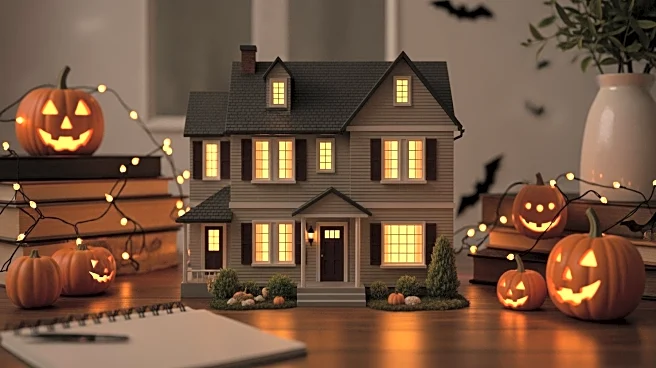What's Happening?
Netflix has sold a home prominently featured in its hit series 'Stranger Things' to a pair of diehard fans for $365,000. The property, located in East Point's Cheviot Hills neighborhood in Atlanta, served
as the fictional home of the Wheeler family throughout the series. Although Netflix purchased the home for $425,000 in 2021, it was listed for $350,000 before being sold to the fans who offered $15,000 over the asking price. The couple, who are avid fans of the show, expressed their excitement and commitment to preserving the legacy of the house in a heartfelt letter to Netflix. The home, built in 1963, retains its 1980s charm with wood-paneled walls and brick fireplaces, and includes four bedrooms and three bathrooms across 2,500 square feet.
Why It's Important?
The sale of the 'Stranger Things' home highlights the cultural impact and enduring popularity of the series, which has captivated audiences since its debut in 2016. The transaction underscores the strong connection fans have with the show's nostalgic 1980s setting and its memorable characters. This sale also reflects the growing trend of fans purchasing properties associated with popular media, turning them into themed experiences or personal memorabilia. For Netflix, this move is part of a broader strategy to engage with its audience beyond the screen, potentially increasing brand loyalty and expanding its influence in the entertainment industry.
What's Next?
The new owners plan to honor the legacy of the 'Stranger Things' house and have expressed interest in participating in future projects or reunions related to the series. As the final season of 'Stranger Things' approaches, there may be increased interest in properties associated with the show, potentially leading to more sales or themed experiences. Netflix's strategy of selling iconic properties could inspire other studios to explore similar opportunities, further blending real estate with entertainment.
Beyond the Headlines
The sale of the 'Stranger Things' home to fans illustrates the intersection of real estate and entertainment, where properties become cultural landmarks. This trend raises questions about the preservation of such homes and their impact on local communities. As fans seek to own pieces of their favorite shows, the real estate market may see a rise in themed properties, influencing neighborhood dynamics and property values. Additionally, this phenomenon highlights the emotional and nostalgic connections people form with media, driving unique consumer behaviors.










